Analyzing the Role of Accounting in Barclays' Business Improvement
VerifiedAdded on 2022/12/22
|8
|1920
|100
Report
AI Summary
This report analyzes the role and significance of accounting within Barclays, a multinational investment bank. It explores the types of accounting used, including cost, managerial, and financial accounting, and their impact on business performance. The report identifies the key roles of accounting, such as preparing budgets, preventing errors, and evaluating employee performance. It highlights the significance of accounting for Barclays, emphasizing its role in decision-making, record-keeping, and reporting profits. The study also evaluates the challenges Barclays would face by not following accounting standards, such as decreased transparency and unforeseen expenses. The conclusion emphasizes the importance of accounting for business success and recommends simplified financial statements and projected cash flow statements. Secondary sources like books and journals were used to gather information. The report provides valuable insights into how accounting practices contribute to Barclays' financial goals and overall business improvement.
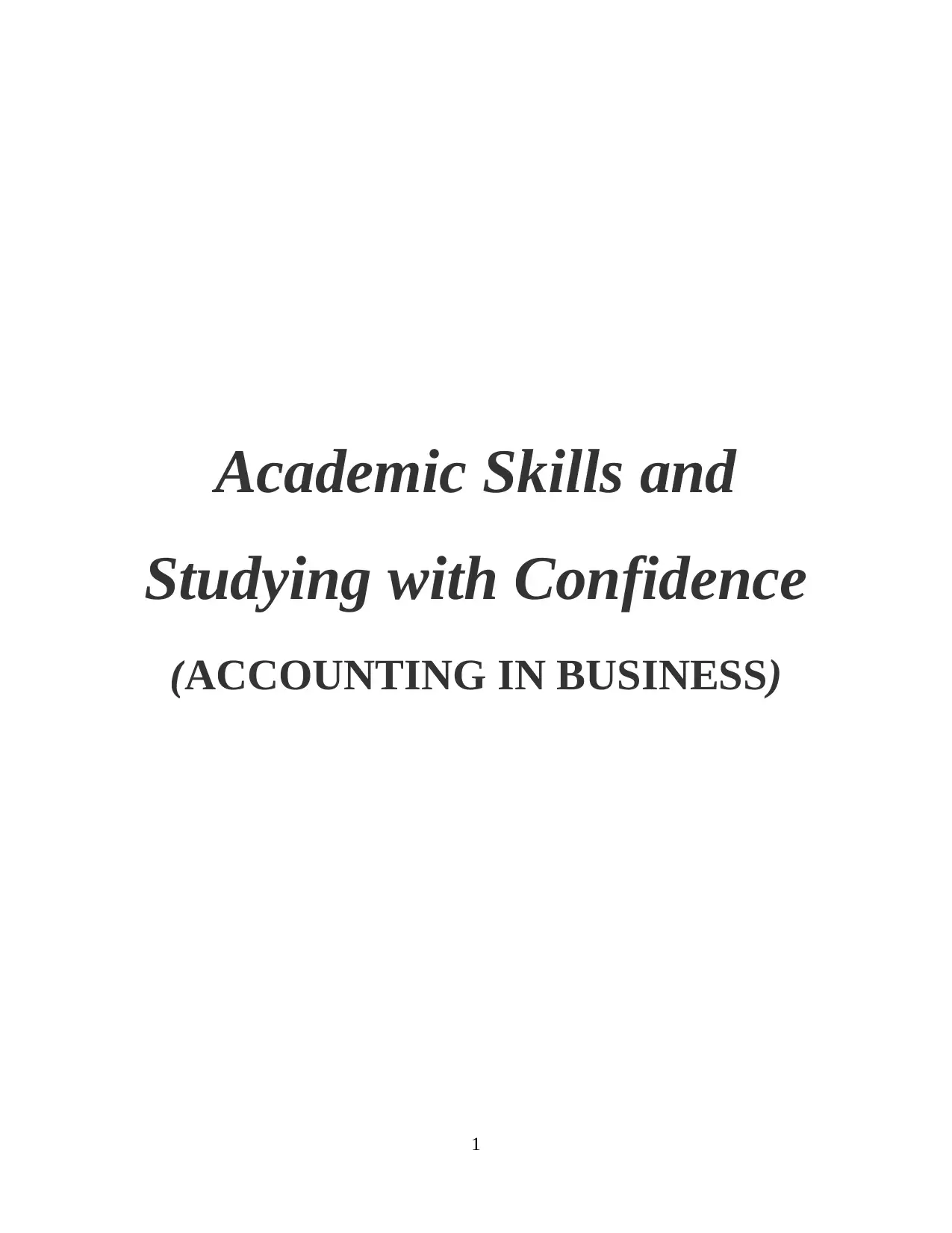
Academic Skills and
Studying with Confidence
(ACCOUNTING IN BUSINESS)
1
Studying with Confidence
(ACCOUNTING IN BUSINESS)
1
Paraphrase This Document
Need a fresh take? Get an instant paraphrase of this document with our AI Paraphraser
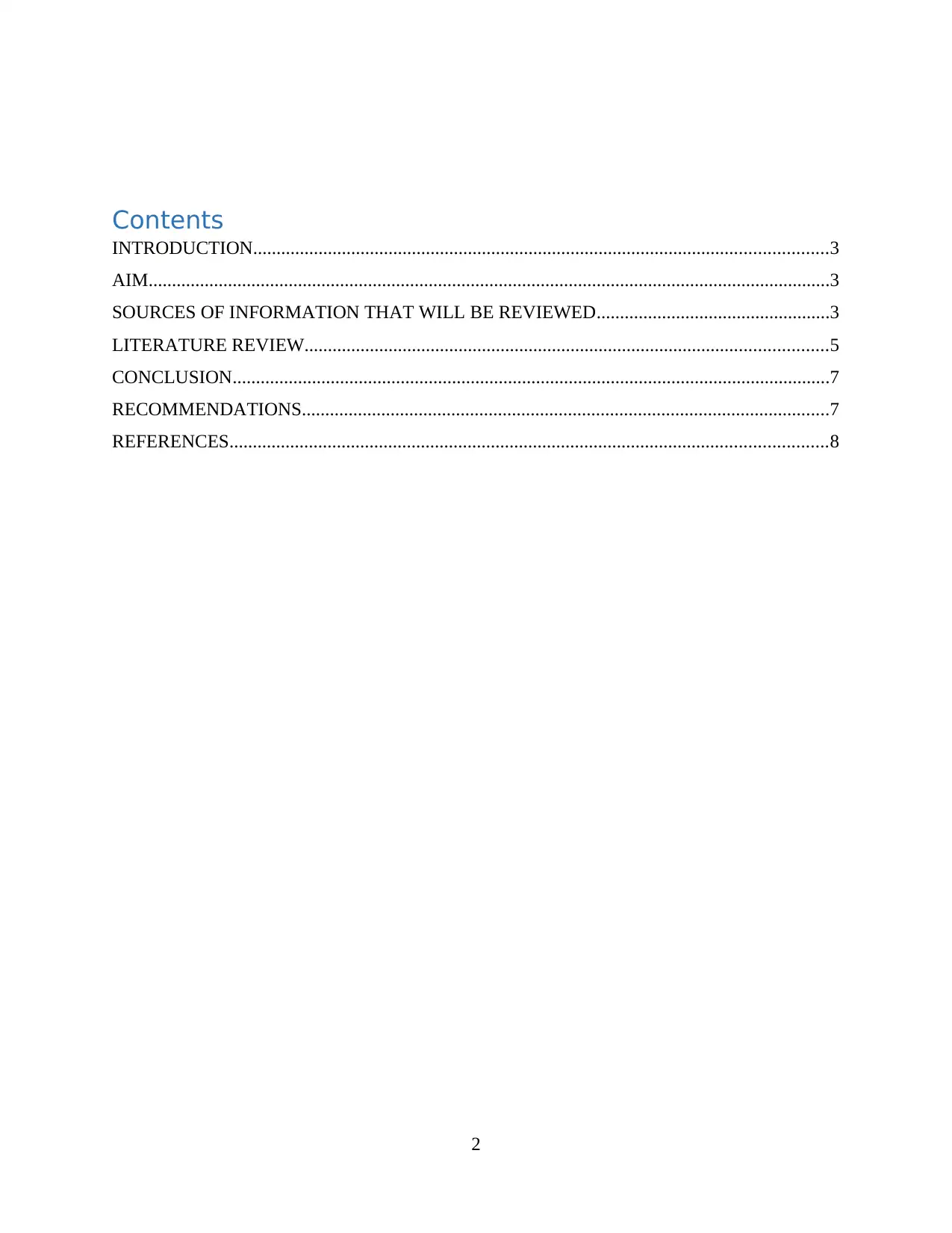
Contents
INTRODUCTION...........................................................................................................................3
AIM..................................................................................................................................................3
SOURCES OF INFORMATION THAT WILL BE REVIEWED..................................................3
LITERATURE REVIEW................................................................................................................5
CONCLUSION................................................................................................................................7
RECOMMENDATIONS.................................................................................................................7
REFERENCES................................................................................................................................8
2
INTRODUCTION...........................................................................................................................3
AIM..................................................................................................................................................3
SOURCES OF INFORMATION THAT WILL BE REVIEWED..................................................3
LITERATURE REVIEW................................................................................................................5
CONCLUSION................................................................................................................................7
RECOMMENDATIONS.................................................................................................................7
REFERENCES................................................................................................................................8
2
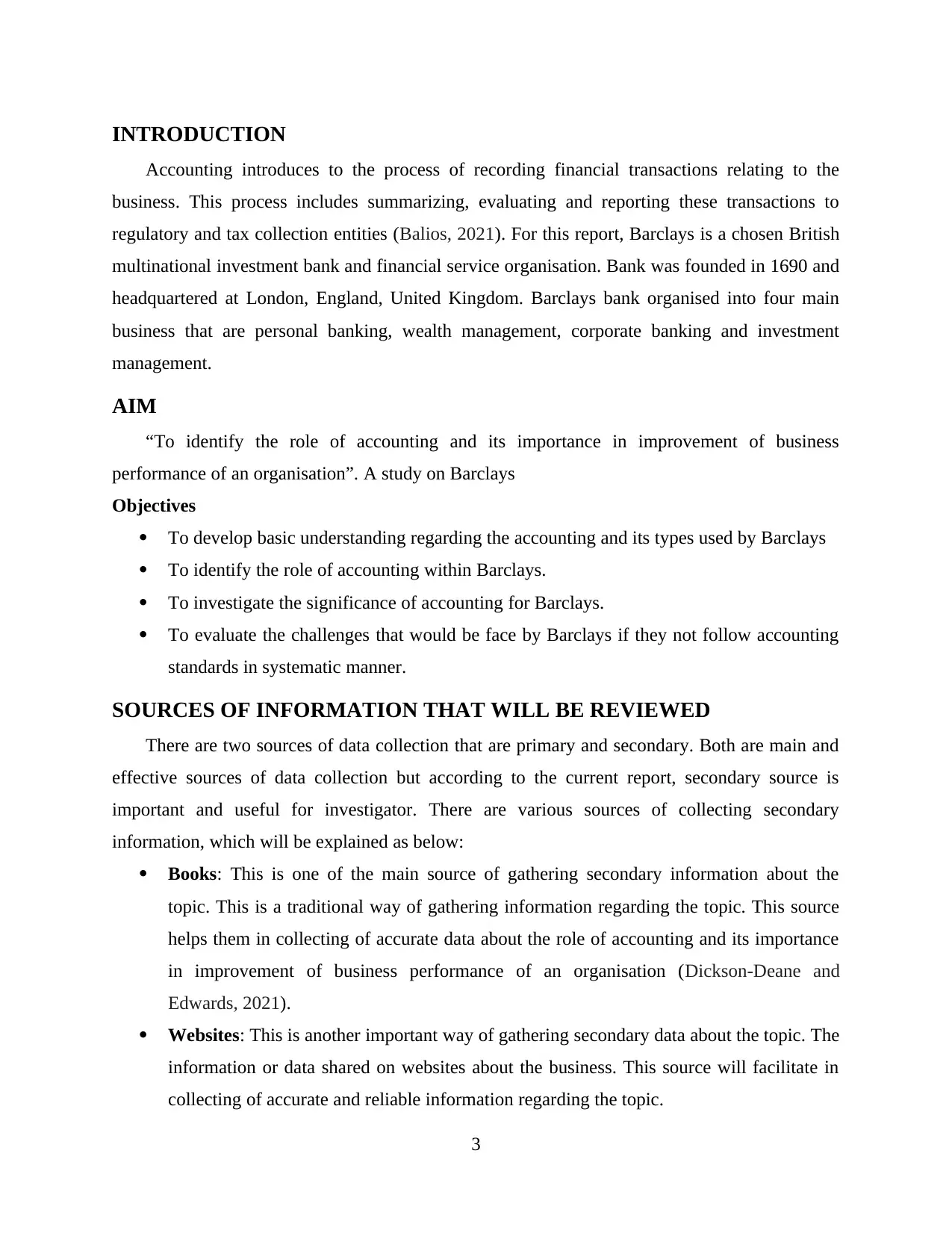
INTRODUCTION
Accounting introduces to the process of recording financial transactions relating to the
business. This process includes summarizing, evaluating and reporting these transactions to
regulatory and tax collection entities (Balios, 2021). For this report, Barclays is a chosen British
multinational investment bank and financial service organisation. Bank was founded in 1690 and
headquartered at London, England, United Kingdom. Barclays bank organised into four main
business that are personal banking, wealth management, corporate banking and investment
management.
AIM
“To identify the role of accounting and its importance in improvement of business
performance of an organisation”. A study on Barclays
Objectives
To develop basic understanding regarding the accounting and its types used by Barclays
To identify the role of accounting within Barclays.
To investigate the significance of accounting for Barclays.
To evaluate the challenges that would be face by Barclays if they not follow accounting
standards in systematic manner.
SOURCES OF INFORMATION THAT WILL BE REVIEWED
There are two sources of data collection that are primary and secondary. Both are main and
effective sources of data collection but according to the current report, secondary source is
important and useful for investigator. There are various sources of collecting secondary
information, which will be explained as below:
Books: This is one of the main source of gathering secondary information about the
topic. This is a traditional way of gathering information regarding the topic. This source
helps them in collecting of accurate data about the role of accounting and its importance
in improvement of business performance of an organisation (Dickson-Deane and
Edwards, 2021).
Websites: This is another important way of gathering secondary data about the topic. The
information or data shared on websites about the business. This source will facilitate in
collecting of accurate and reliable information regarding the topic.
3
Accounting introduces to the process of recording financial transactions relating to the
business. This process includes summarizing, evaluating and reporting these transactions to
regulatory and tax collection entities (Balios, 2021). For this report, Barclays is a chosen British
multinational investment bank and financial service organisation. Bank was founded in 1690 and
headquartered at London, England, United Kingdom. Barclays bank organised into four main
business that are personal banking, wealth management, corporate banking and investment
management.
AIM
“To identify the role of accounting and its importance in improvement of business
performance of an organisation”. A study on Barclays
Objectives
To develop basic understanding regarding the accounting and its types used by Barclays
To identify the role of accounting within Barclays.
To investigate the significance of accounting for Barclays.
To evaluate the challenges that would be face by Barclays if they not follow accounting
standards in systematic manner.
SOURCES OF INFORMATION THAT WILL BE REVIEWED
There are two sources of data collection that are primary and secondary. Both are main and
effective sources of data collection but according to the current report, secondary source is
important and useful for investigator. There are various sources of collecting secondary
information, which will be explained as below:
Books: This is one of the main source of gathering secondary information about the
topic. This is a traditional way of gathering information regarding the topic. This source
helps them in collecting of accurate data about the role of accounting and its importance
in improvement of business performance of an organisation (Dickson-Deane and
Edwards, 2021).
Websites: This is another important way of gathering secondary data about the topic. The
information or data shared on websites about the business. This source will facilitate in
collecting of accurate and reliable information regarding the topic.
3
⊘ This is a preview!⊘
Do you want full access?
Subscribe today to unlock all pages.

Trusted by 1+ million students worldwide
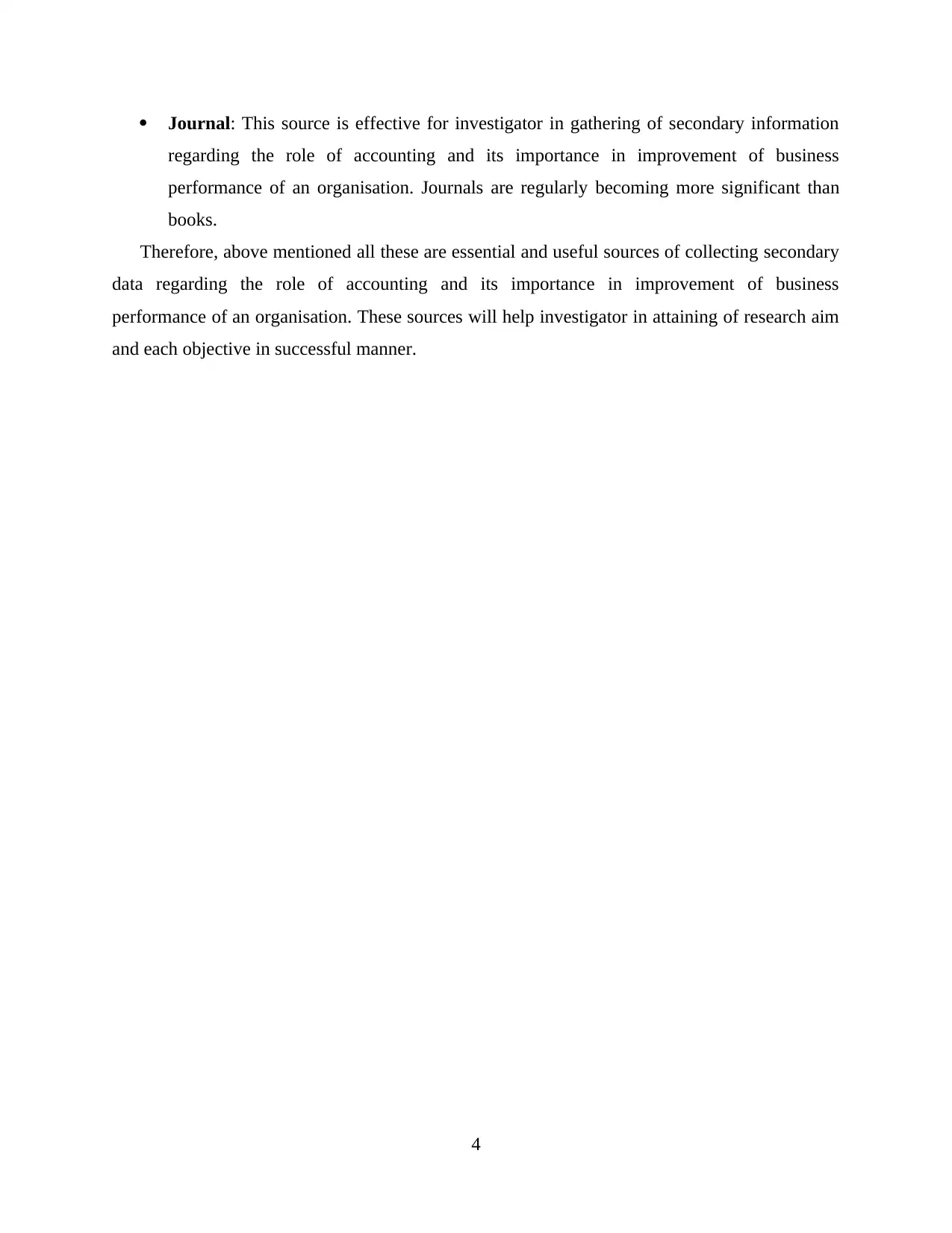
Journal: This source is effective for investigator in gathering of secondary information
regarding the role of accounting and its importance in improvement of business
performance of an organisation. Journals are regularly becoming more significant than
books.
Therefore, above mentioned all these are essential and useful sources of collecting secondary
data regarding the role of accounting and its importance in improvement of business
performance of an organisation. These sources will help investigator in attaining of research aim
and each objective in successful manner.
4
regarding the role of accounting and its importance in improvement of business
performance of an organisation. Journals are regularly becoming more significant than
books.
Therefore, above mentioned all these are essential and useful sources of collecting secondary
data regarding the role of accounting and its importance in improvement of business
performance of an organisation. These sources will help investigator in attaining of research aim
and each objective in successful manner.
4
Paraphrase This Document
Need a fresh take? Get an instant paraphrase of this document with our AI Paraphraser
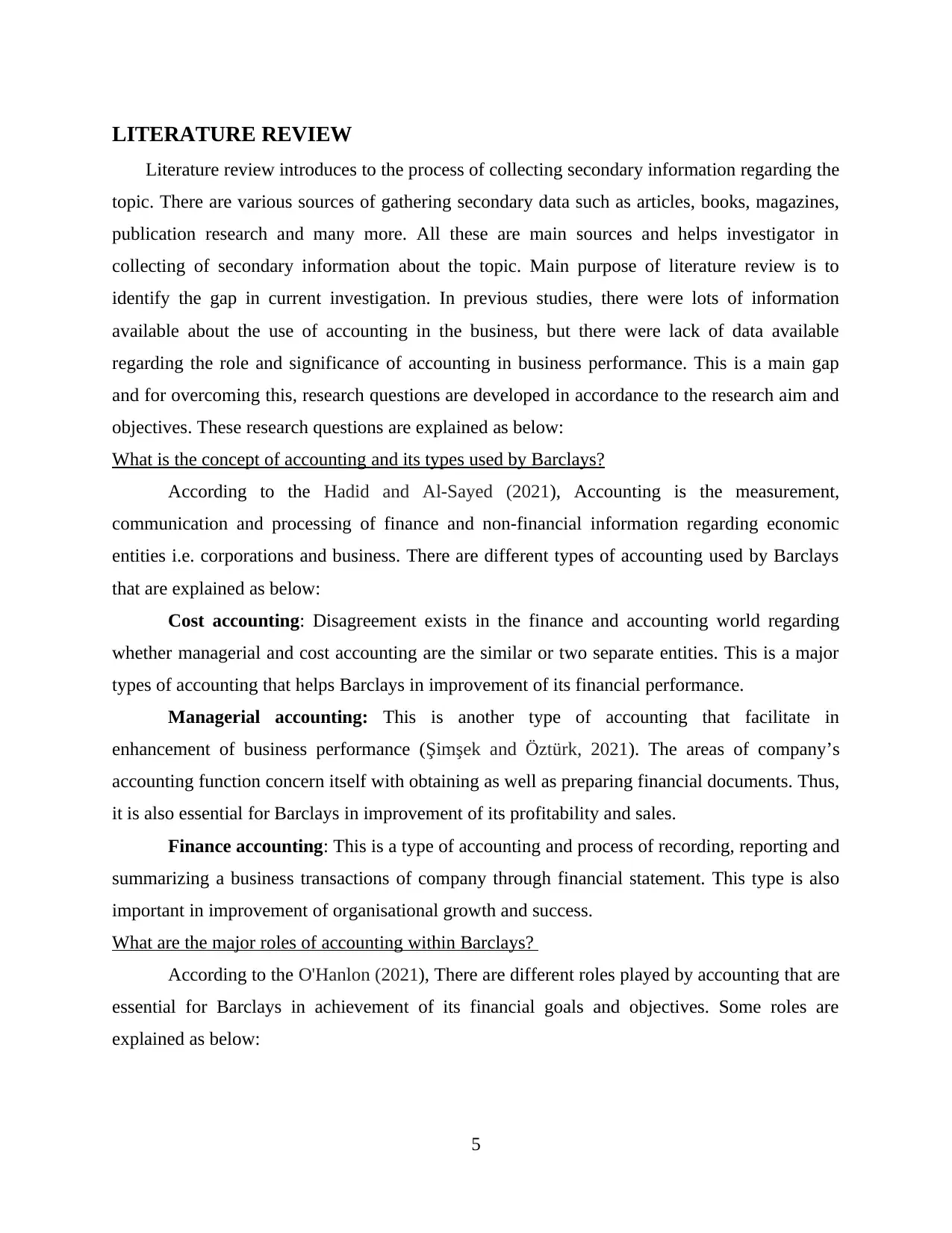
LITERATURE REVIEW
Literature review introduces to the process of collecting secondary information regarding the
topic. There are various sources of gathering secondary data such as articles, books, magazines,
publication research and many more. All these are main sources and helps investigator in
collecting of secondary information about the topic. Main purpose of literature review is to
identify the gap in current investigation. In previous studies, there were lots of information
available about the use of accounting in the business, but there were lack of data available
regarding the role and significance of accounting in business performance. This is a main gap
and for overcoming this, research questions are developed in accordance to the research aim and
objectives. These research questions are explained as below:
What is the concept of accounting and its types used by Barclays?
According to the Hadid and Al-Sayed (2021), Accounting is the measurement,
communication and processing of finance and non-financial information regarding economic
entities i.e. corporations and business. There are different types of accounting used by Barclays
that are explained as below:
Cost accounting: Disagreement exists in the finance and accounting world regarding
whether managerial and cost accounting are the similar or two separate entities. This is a major
types of accounting that helps Barclays in improvement of its financial performance.
Managerial accounting: This is another type of accounting that facilitate in
enhancement of business performance (Şimşek and Öztürk, 2021). The areas of company’s
accounting function concern itself with obtaining as well as preparing financial documents. Thus,
it is also essential for Barclays in improvement of its profitability and sales.
Finance accounting: This is a type of accounting and process of recording, reporting and
summarizing a business transactions of company through financial statement. This type is also
important in improvement of organisational growth and success.
What are the major roles of accounting within Barclays?
According to the O'Hanlon (2021), There are different roles played by accounting that are
essential for Barclays in achievement of its financial goals and objectives. Some roles are
explained as below:
5
Literature review introduces to the process of collecting secondary information regarding the
topic. There are various sources of gathering secondary data such as articles, books, magazines,
publication research and many more. All these are main sources and helps investigator in
collecting of secondary information about the topic. Main purpose of literature review is to
identify the gap in current investigation. In previous studies, there were lots of information
available about the use of accounting in the business, but there were lack of data available
regarding the role and significance of accounting in business performance. This is a main gap
and for overcoming this, research questions are developed in accordance to the research aim and
objectives. These research questions are explained as below:
What is the concept of accounting and its types used by Barclays?
According to the Hadid and Al-Sayed (2021), Accounting is the measurement,
communication and processing of finance and non-financial information regarding economic
entities i.e. corporations and business. There are different types of accounting used by Barclays
that are explained as below:
Cost accounting: Disagreement exists in the finance and accounting world regarding
whether managerial and cost accounting are the similar or two separate entities. This is a major
types of accounting that helps Barclays in improvement of its financial performance.
Managerial accounting: This is another type of accounting that facilitate in
enhancement of business performance (Şimşek and Öztürk, 2021). The areas of company’s
accounting function concern itself with obtaining as well as preparing financial documents. Thus,
it is also essential for Barclays in improvement of its profitability and sales.
Finance accounting: This is a type of accounting and process of recording, reporting and
summarizing a business transactions of company through financial statement. This type is also
important in improvement of organisational growth and success.
What are the major roles of accounting within Barclays?
According to the O'Hanlon (2021), There are different roles played by accounting that are
essential for Barclays in achievement of its financial goals and objectives. Some roles are
explained as below:
5
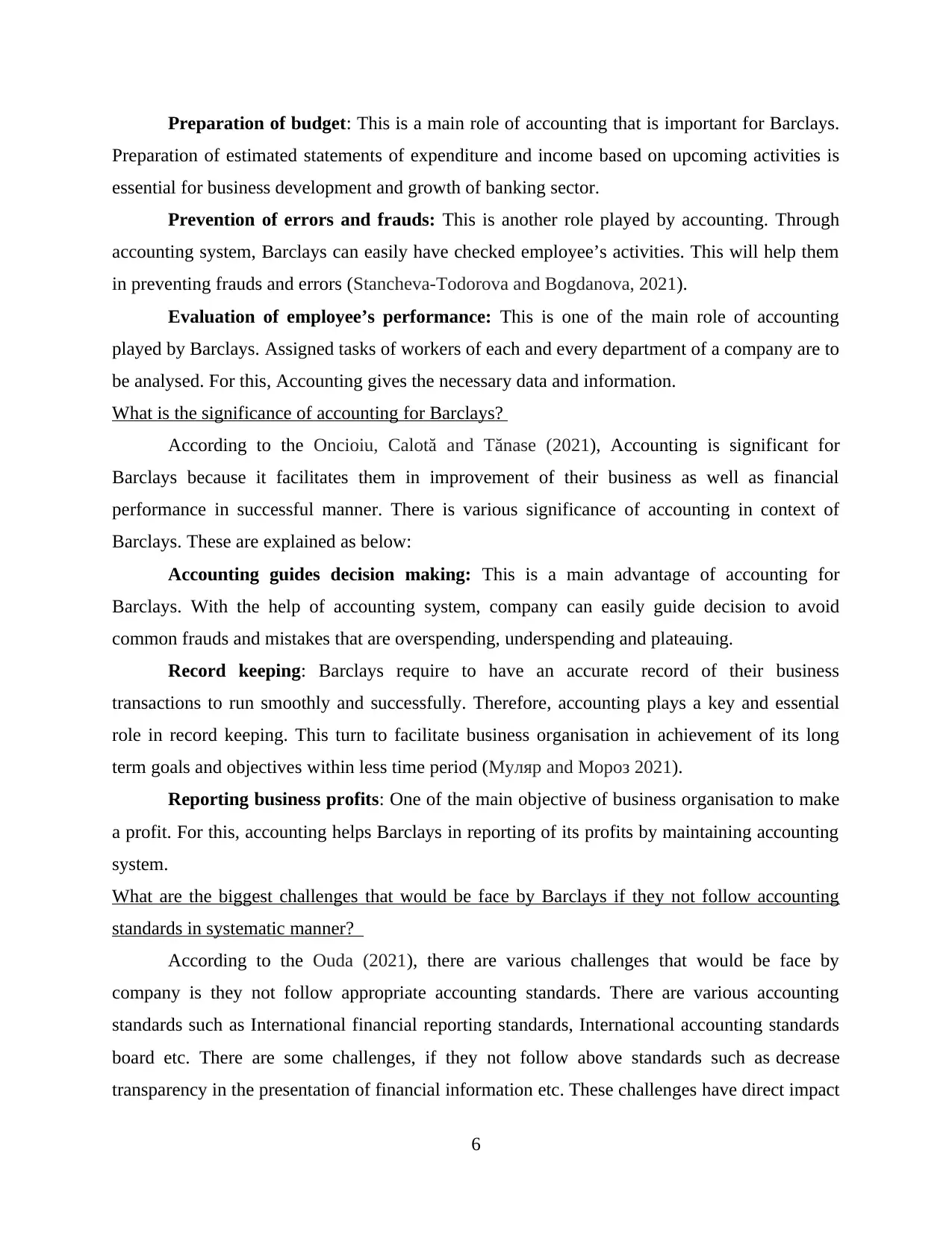
Preparation of budget: This is a main role of accounting that is important for Barclays.
Preparation of estimated statements of expenditure and income based on upcoming activities is
essential for business development and growth of banking sector.
Prevention of errors and frauds: This is another role played by accounting. Through
accounting system, Barclays can easily have checked employee’s activities. This will help them
in preventing frauds and errors (Stancheva-Todorova and Bogdanova, 2021).
Evaluation of employee’s performance: This is one of the main role of accounting
played by Barclays. Assigned tasks of workers of each and every department of a company are to
be analysed. For this, Accounting gives the necessary data and information.
What is the significance of accounting for Barclays?
According to the Oncioiu, Calotă and Tănase (2021), Accounting is significant for
Barclays because it facilitates them in improvement of their business as well as financial
performance in successful manner. There is various significance of accounting in context of
Barclays. These are explained as below:
Accounting guides decision making: This is a main advantage of accounting for
Barclays. With the help of accounting system, company can easily guide decision to avoid
common frauds and mistakes that are overspending, underspending and plateauing.
Record keeping: Barclays require to have an accurate record of their business
transactions to run smoothly and successfully. Therefore, accounting plays a key and essential
role in record keeping. This turn to facilitate business organisation in achievement of its long
term goals and objectives within less time period (Муляр and Мороз 2021).
Reporting business profits: One of the main objective of business organisation to make
a profit. For this, accounting helps Barclays in reporting of its profits by maintaining accounting
system.
What are the biggest challenges that would be face by Barclays if they not follow accounting
standards in systematic manner?
According to the Ouda (2021), there are various challenges that would be face by
company is they not follow appropriate accounting standards. There are various accounting
standards such as International financial reporting standards, International accounting standards
board etc. There are some challenges, if they not follow above standards such as decrease
transparency in the presentation of financial information etc. These challenges have direct impact
6
Preparation of estimated statements of expenditure and income based on upcoming activities is
essential for business development and growth of banking sector.
Prevention of errors and frauds: This is another role played by accounting. Through
accounting system, Barclays can easily have checked employee’s activities. This will help them
in preventing frauds and errors (Stancheva-Todorova and Bogdanova, 2021).
Evaluation of employee’s performance: This is one of the main role of accounting
played by Barclays. Assigned tasks of workers of each and every department of a company are to
be analysed. For this, Accounting gives the necessary data and information.
What is the significance of accounting for Barclays?
According to the Oncioiu, Calotă and Tănase (2021), Accounting is significant for
Barclays because it facilitates them in improvement of their business as well as financial
performance in successful manner. There is various significance of accounting in context of
Barclays. These are explained as below:
Accounting guides decision making: This is a main advantage of accounting for
Barclays. With the help of accounting system, company can easily guide decision to avoid
common frauds and mistakes that are overspending, underspending and plateauing.
Record keeping: Barclays require to have an accurate record of their business
transactions to run smoothly and successfully. Therefore, accounting plays a key and essential
role in record keeping. This turn to facilitate business organisation in achievement of its long
term goals and objectives within less time period (Муляр and Мороз 2021).
Reporting business profits: One of the main objective of business organisation to make
a profit. For this, accounting helps Barclays in reporting of its profits by maintaining accounting
system.
What are the biggest challenges that would be face by Barclays if they not follow accounting
standards in systematic manner?
According to the Ouda (2021), there are various challenges that would be face by
company is they not follow appropriate accounting standards. There are various accounting
standards such as International financial reporting standards, International accounting standards
board etc. There are some challenges, if they not follow above standards such as decrease
transparency in the presentation of financial information etc. These challenges have direct impact
6
⊘ This is a preview!⊘
Do you want full access?
Subscribe today to unlock all pages.

Trusted by 1+ million students worldwide
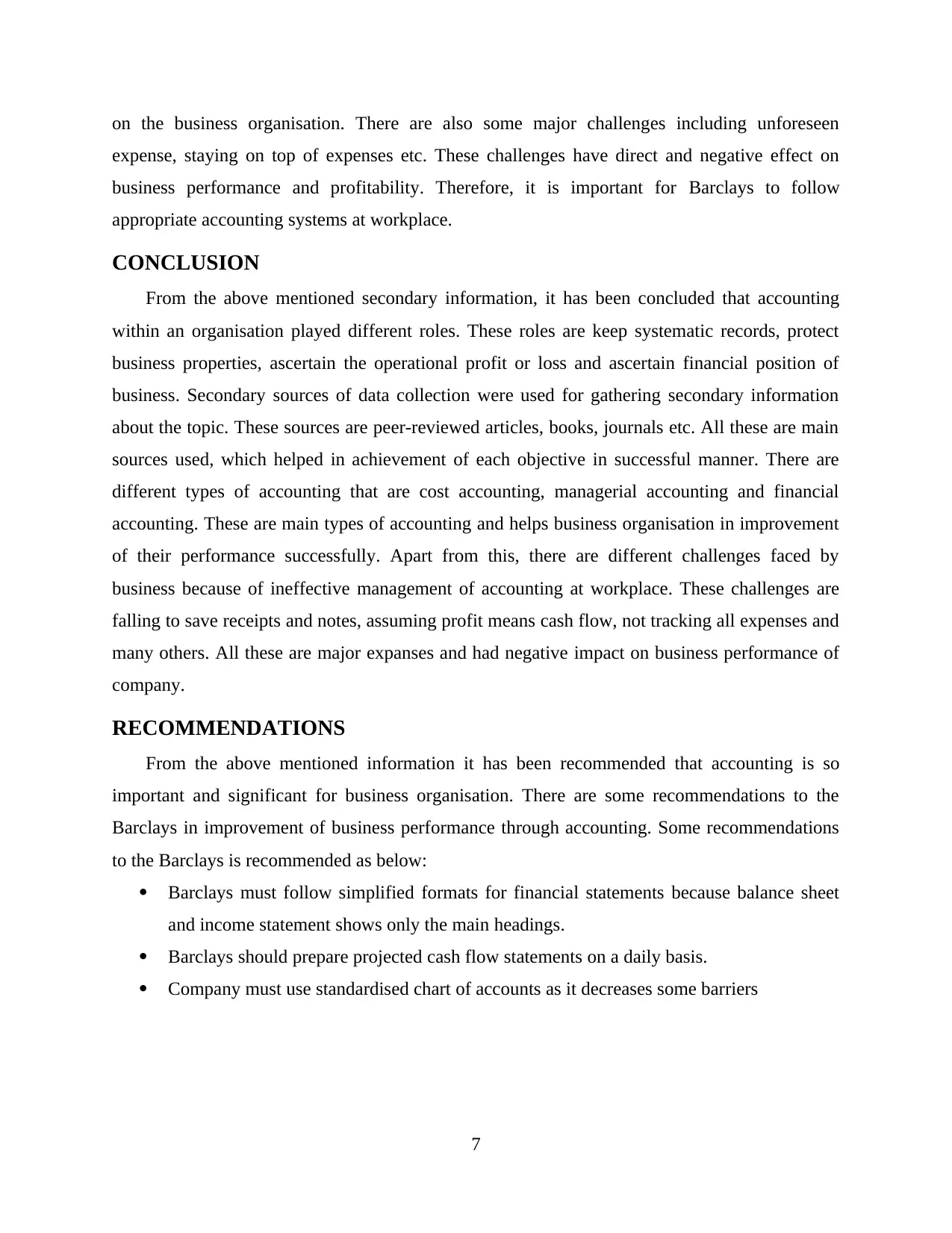
on the business organisation. There are also some major challenges including unforeseen
expense, staying on top of expenses etc. These challenges have direct and negative effect on
business performance and profitability. Therefore, it is important for Barclays to follow
appropriate accounting systems at workplace.
CONCLUSION
From the above mentioned secondary information, it has been concluded that accounting
within an organisation played different roles. These roles are keep systematic records, protect
business properties, ascertain the operational profit or loss and ascertain financial position of
business. Secondary sources of data collection were used for gathering secondary information
about the topic. These sources are peer-reviewed articles, books, journals etc. All these are main
sources used, which helped in achievement of each objective in successful manner. There are
different types of accounting that are cost accounting, managerial accounting and financial
accounting. These are main types of accounting and helps business organisation in improvement
of their performance successfully. Apart from this, there are different challenges faced by
business because of ineffective management of accounting at workplace. These challenges are
falling to save receipts and notes, assuming profit means cash flow, not tracking all expenses and
many others. All these are major expanses and had negative impact on business performance of
company.
RECOMMENDATIONS
From the above mentioned information it has been recommended that accounting is so
important and significant for business organisation. There are some recommendations to the
Barclays in improvement of business performance through accounting. Some recommendations
to the Barclays is recommended as below:
Barclays must follow simplified formats for financial statements because balance sheet
and income statement shows only the main headings.
Barclays should prepare projected cash flow statements on a daily basis.
Company must use standardised chart of accounts as it decreases some barriers
7
expense, staying on top of expenses etc. These challenges have direct and negative effect on
business performance and profitability. Therefore, it is important for Barclays to follow
appropriate accounting systems at workplace.
CONCLUSION
From the above mentioned secondary information, it has been concluded that accounting
within an organisation played different roles. These roles are keep systematic records, protect
business properties, ascertain the operational profit or loss and ascertain financial position of
business. Secondary sources of data collection were used for gathering secondary information
about the topic. These sources are peer-reviewed articles, books, journals etc. All these are main
sources used, which helped in achievement of each objective in successful manner. There are
different types of accounting that are cost accounting, managerial accounting and financial
accounting. These are main types of accounting and helps business organisation in improvement
of their performance successfully. Apart from this, there are different challenges faced by
business because of ineffective management of accounting at workplace. These challenges are
falling to save receipts and notes, assuming profit means cash flow, not tracking all expenses and
many others. All these are major expanses and had negative impact on business performance of
company.
RECOMMENDATIONS
From the above mentioned information it has been recommended that accounting is so
important and significant for business organisation. There are some recommendations to the
Barclays in improvement of business performance through accounting. Some recommendations
to the Barclays is recommended as below:
Barclays must follow simplified formats for financial statements because balance sheet
and income statement shows only the main headings.
Barclays should prepare projected cash flow statements on a daily basis.
Company must use standardised chart of accounts as it decreases some barriers
7
Paraphrase This Document
Need a fresh take? Get an instant paraphrase of this document with our AI Paraphraser
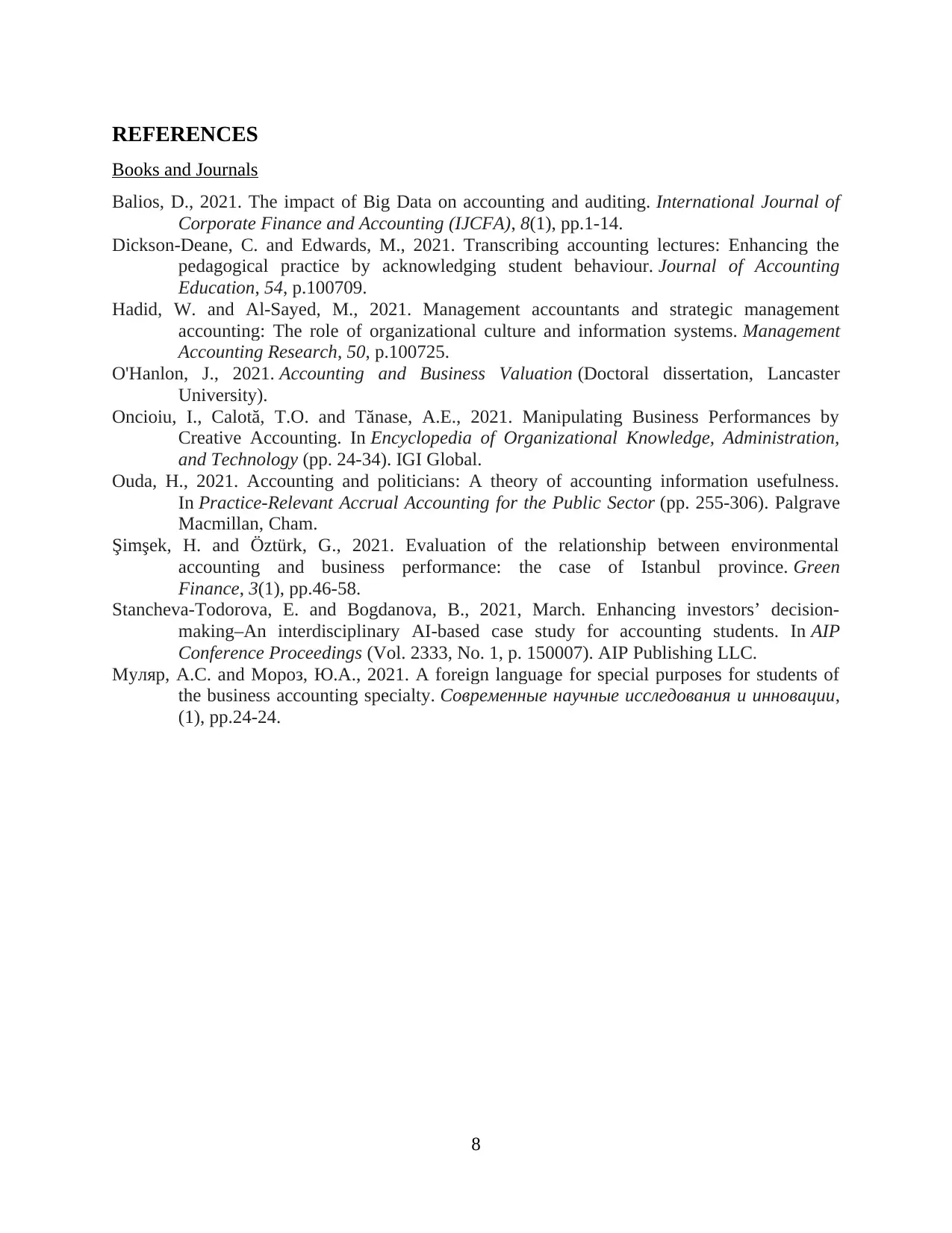
REFERENCES
Books and Journals
Balios, D., 2021. The impact of Big Data on accounting and auditing. International Journal of
Corporate Finance and Accounting (IJCFA), 8(1), pp.1-14.
Dickson-Deane, C. and Edwards, M., 2021. Transcribing accounting lectures: Enhancing the
pedagogical practice by acknowledging student behaviour. Journal of Accounting
Education, 54, p.100709.
Hadid, W. and Al-Sayed, M., 2021. Management accountants and strategic management
accounting: The role of organizational culture and information systems. Management
Accounting Research, 50, p.100725.
O'Hanlon, J., 2021. Accounting and Business Valuation (Doctoral dissertation, Lancaster
University).
Oncioiu, I., Calotă, T.O. and Tănase, A.E., 2021. Manipulating Business Performances by
Creative Accounting. In Encyclopedia of Organizational Knowledge, Administration,
and Technology (pp. 24-34). IGI Global.
Ouda, H., 2021. Accounting and politicians: A theory of accounting information usefulness.
In Practice-Relevant Accrual Accounting for the Public Sector (pp. 255-306). Palgrave
Macmillan, Cham.
Şimşek, H. and Öztürk, G., 2021. Evaluation of the relationship between environmental
accounting and business performance: the case of Istanbul province. Green
Finance, 3(1), pp.46-58.
Stancheva-Todorova, E. and Bogdanova, B., 2021, March. Enhancing investors’ decision-
making–An interdisciplinary AI-based case study for accounting students. In AIP
Conference Proceedings (Vol. 2333, No. 1, p. 150007). AIP Publishing LLC.
Муляр, А.С. and Мороз, Ю.А., 2021. A foreign language for special purposes for students of
the business accounting specialty. Современные научные исследования и инновации,
(1), pp.24-24.
8
Books and Journals
Balios, D., 2021. The impact of Big Data on accounting and auditing. International Journal of
Corporate Finance and Accounting (IJCFA), 8(1), pp.1-14.
Dickson-Deane, C. and Edwards, M., 2021. Transcribing accounting lectures: Enhancing the
pedagogical practice by acknowledging student behaviour. Journal of Accounting
Education, 54, p.100709.
Hadid, W. and Al-Sayed, M., 2021. Management accountants and strategic management
accounting: The role of organizational culture and information systems. Management
Accounting Research, 50, p.100725.
O'Hanlon, J., 2021. Accounting and Business Valuation (Doctoral dissertation, Lancaster
University).
Oncioiu, I., Calotă, T.O. and Tănase, A.E., 2021. Manipulating Business Performances by
Creative Accounting. In Encyclopedia of Organizational Knowledge, Administration,
and Technology (pp. 24-34). IGI Global.
Ouda, H., 2021. Accounting and politicians: A theory of accounting information usefulness.
In Practice-Relevant Accrual Accounting for the Public Sector (pp. 255-306). Palgrave
Macmillan, Cham.
Şimşek, H. and Öztürk, G., 2021. Evaluation of the relationship between environmental
accounting and business performance: the case of Istanbul province. Green
Finance, 3(1), pp.46-58.
Stancheva-Todorova, E. and Bogdanova, B., 2021, March. Enhancing investors’ decision-
making–An interdisciplinary AI-based case study for accounting students. In AIP
Conference Proceedings (Vol. 2333, No. 1, p. 150007). AIP Publishing LLC.
Муляр, А.С. and Мороз, Ю.А., 2021. A foreign language for special purposes for students of
the business accounting specialty. Современные научные исследования и инновации,
(1), pp.24-24.
8
1 out of 8
Related Documents
Your All-in-One AI-Powered Toolkit for Academic Success.
+13062052269
info@desklib.com
Available 24*7 on WhatsApp / Email
![[object Object]](/_next/static/media/star-bottom.7253800d.svg)
Unlock your academic potential
Copyright © 2020–2026 A2Z Services. All Rights Reserved. Developed and managed by ZUCOL.




